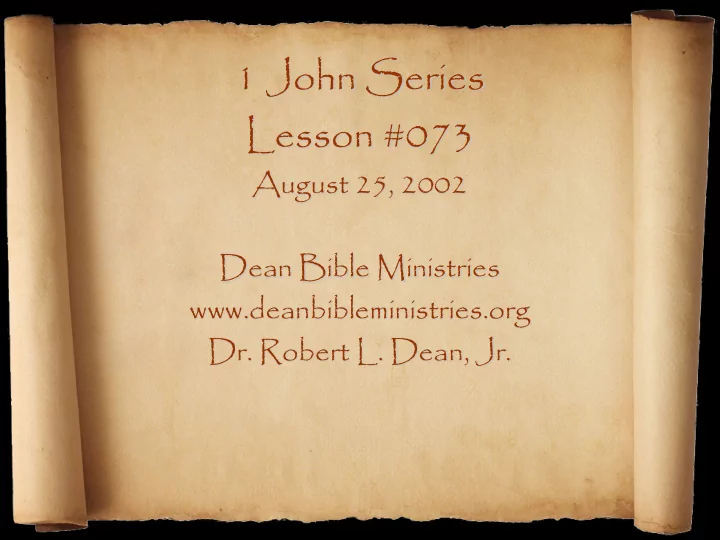

1 John Series Lesson #073 August 25, 2002 Dean Bible Ministries www.deanbibleministries.org Dr. Robert L. Dean, Jr.
1 John 4:19, “We love Him because He first loved us.”
1. There are basically three Greek New Testaments available for study today. The first is the Nestle-Aland Text or the UBS text. This is also called the Critical Text. The Critical Text is the basis for the NASB, the NIV, and almost all modern translations.
2. The Critical Text follows a certain way of deciding between different readings by emphasizing the oldest manuscripts which are usually classified as the Alexandrian texts.
3. In contrast to this there is a second text called the TR, or Textus Receptus, which is Latin for the “received text”. This is basically the Greek text that was the basis for the KJV translation in 1611 and was based on only 8 or 9 Greek manuscripts, the oldest of which went back to the 9 th century. The TR is the basis for the KJV and NKJV.
4. The Majority Text (MT) Often there is a misrepresentation that the TR and the MT are basically the same, but there are well over a thousand differences between the TR and the MT. No translation is based on the MT.
5. My inclination is that the MT is probably more likely than not to be the superior reading.
6. The evidence is the Codex Vaticanus, and Codex Alexandrinus, two MSS, omit the auton “him”. All the Byzantine Family of MSS and the Western Text type include this, and the third of the Big Three, Sinaiticus, inserts Theon, “God”. So there are basically two MSS and their copies that delete this. Context also suggests its inclusion. Therefore we must reject the NIV and NASB reading and translate this “We love Him”.
“because He first loved us”
The emphasis here is that it is the divine initiative of love that is the basis for the believer’s love.
1. The 1P pronoun “we” and “us” must continue to be understood in the context of the epistle as the apostolic community, the apostles and their immediate assistants.
2. The “We” therefore does not mean “we Christians” or “we human beings” but “we apostles as spiritually mature believers”.
3. Therefore, we spiritually mature believers who have matured in our Personal Love for God love, only because of the divine initiative of God.
4. First, God loved us, then, as we learned doctrine and understood the many aspects of our salvation and the unique spiritual life of the Church, we began to love Him.
E SSENCE OF G OD Sovereign Omniscience Righteousness Omnipresent Omnipotent Justice Love Veracity Immutability Eternal Life
E SSENCE OF G OD Sovereign Omniscience Righteousness Omnipresent Justice Omnipotent Veracity Love Righteousness Immutability Eternal Life Justice Love Truth
SOV O JUSTICE +R GRACE O E.L. LOVE O VERACITY Immutable
1 John 4:20, “If someone says, ‘I love God,’ and hates his brother, he is a liar; for the one who does not love his brother whom he has seen, cannot love God whom he has not seen.”
1. Love for God is characterized by doctrinal orientation and consistent application of doctrine.
1 John 2:5, “but whoever keeps His word, in him the love of God has truly been perfected. By this we know that we are in Him:”
1 John 5:2, “By this we know that we love the children of God, when we love God and observe His commandments.”
1 John 5:3, “For this is the love of God, that we keep His commandments; and His commandments are not burdensome.”
2. You can’t apply what you don’t know, and you can’t know His Word without making that a priority.
3. When you love someone you want to please them.
4. When we love God we please Him by applying His Word.
5. Personal Love for God (PLG) is characterized by helping another believer when we have the ability to do so.
John 3:17, “But whoever has the world’s goods, and sees his brother in need and closes his heart against him, how does the love of God abide in him?”
Love for God is incompatible with hate for another believer.
1 John 2:9, “He who says he is in the light, and hates his brother, is in darkness until now.”
1 John 2:11, “But he who hates his brother is in darkness and walks in darkness, and does not know where he is going, because the darkness has blinded his eyes.”
1 John 1:6, “If we claim to have fellowship with him yet walk in the darkness, we lie and do not live by the truth.”
1 John 3:17, “If anyone has material possessions and sees his brother in need but has no pity on him, how can the love of God be in him?”
1 John 4:12, “No one has ever seen God; but if we love one another, God abides in us and his love is made complete in us.”
1 John 4:21, “And this commandment we have from Him, that the one who loves God should love his brother also.”
Recommend
More recommend